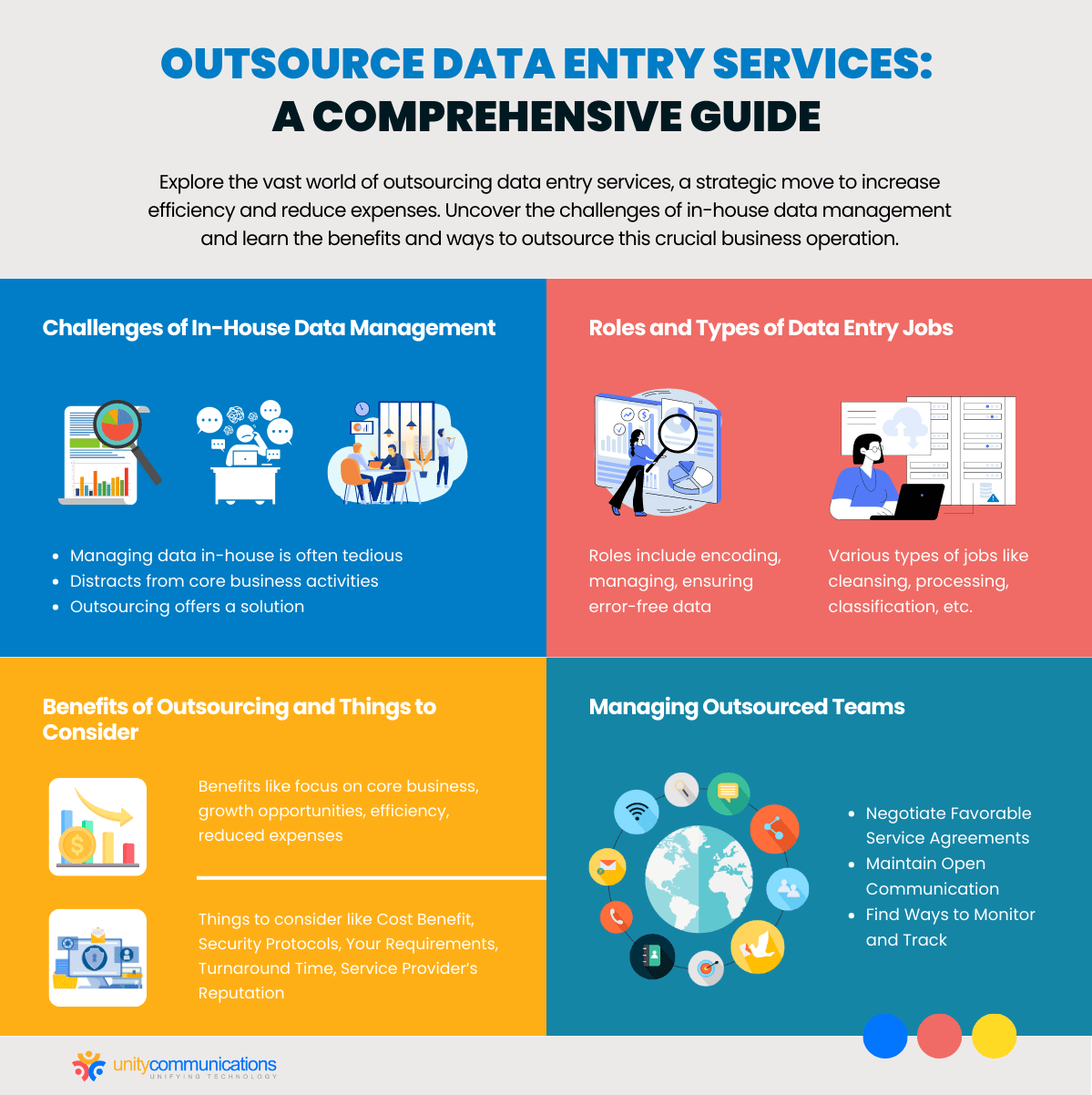IN THIS ARTICLE
Table of Contents
Many organizations leverage data entry outsourcing services to succeed in today’s dynamic and data-driven landscape.
Before joining the bandwagon, consider this question: When and why should your company outsource data entry services?
This article explores the circumstances that make outsourcing strategic and the compelling reasons why organizations opt for third-party data entry functions. As a bonus, it guides you in choosing data entry outsourcing partners.
Stay on this page to find the answers and gain more insights.
The BPO Provider’s Role in Outsourced Data Entry Services

Third-party data entry services involve delegating duties to business process outsourcing (BPO) companies to enhance efficiency and lower costs. These tasks include information formatting, online form entry, order processing, document indexing, inventory management, and database input.
The data entry outsourcing industry remains profitable despite technological advancements. Tecnhavio projects that the market will keep growing at a compound annual growth rate (CAGR) of 6.01% to reach $185.56 million in 2027.
What is the BPO provider’s role in outsourced data entry? It is to deliver specific support, trained personnel, and technical assistance. Key responsibilities include efficiently managing data-related duties, assuring reliability, and optimizing processes for your organization.
Let us explore when, why, and how to outsource data entry services to a BPO company.
When to Outsource Data Entry Services
Recognizing opportunities to outsource data entry services is essential. It is time to delegate data entry tasks when your business is:
- Experiencing peak workloads. Outsourced data entry services are ideal when your business encounters seasonal or high data entry volumes. A BPO provider can efficiently handle increased workloads to support your in-house team.
- Looking for cost-effective solutions. Outsourcing is a smart financial move if maintaining an in-house data entry team is too expensive. It allows you to pay only for the services you need, decreasing fixed costs.
- Reducing non-core functionality. When data entry is not a core competency of your business, consider outsourcing. This approach lets your internal teams focus on strategic initiatives to improve your organization’s growth and competitiveness.
- Seeking industry expertise. BPO firms offer specialized services to industries, such as healthcare data entry outsourcing. They can comply with industry regulations and accurately handle sensitive information.
- Aiming for scalable processes. Businesses experiencing fluctuations in data volumes can outsource data entry, allowing for seamless scalability. You can easily adjust service levels based on demand without the constraints of managing a fixed internal team.
- Focusing on core competencies. Outsourcing data entry services lets your team concentrate on what matters most—core business functions. For instance, assigning medical data entry services to a third-party provider enables healthcare professionals to dedicate more time to patient care than data management.
- Boosting efficiency and productivity. Outsourcing can accelerate data entry output and performance. Many BPO companies can streamline processes, leveraging technology and expertise to deliver faster and more accurate results.
- Adopting globalization and 24/7 operations. For global businesses or those requiring nonstop operations, outsourcing data entry to BPO firms in different time zones ensures continuous data processing and minimizes delays.
Why Outsource Data Entry Services?
Outsource data entry services to nearshore or offshore BPO providers to experience the following advantages:
- Quick response to demand spikes. Trustworthy BPO providers can rapidly respond to sudden spikes in demand, which is one reason why your business should consider outsourcing data entry services. These vendors can swiftly adjust staffing levels to meet urgent deadlines and prevent bottlenecks in data processing.
- Reduced overhead costs. Outsourcing data entry helps significantly lower overhead expenses associated with maintaining an in-house team, including salaries, benefits, office space, utilities, and other infrastructure expenses.
- Increased operational efficiency. Another reason why you should outsource data entry is to access expert service delivery. Third-party vendors specialize in providing non-core functions and can enhance operational efficiency and optimize workflows.
- Higher accuracy. Many BPO organizations possess industry-specific knowledge, contributing to increased data entry precision. Third-party professionals who understand an industry’s intricacies are better equipped to validate, categorize, and process data more accurately.
- Scalable technology infrastructure. Your organization must outsource data entry services because many BPO vendors have flexible technology platforms. They ensure that the software tools used for data entry can seamlessly accommodate increases or decreases in workload.
- More innovation and creativity. Outsourcing non-core functions like data entry allows internal teams to focus on innovation and creative endeavors. This strategic focus can lead to the development of new ideas, products, or services.
- Streamlined processes. Many offshore outsourcing companies apply best practices and simplified procedures, such as process automation, to data entry tasks. These techniques optimize workflows and reduce unnecessary complexities.
- Accessible global talent pool. One reason why your establishment must outsource data entry services is that BPO partners can tap into a diverse and skilled talent pool from around the world. This diversity brings varied expertise and perspectives to data entry tasks.
How to Outsource Data Entry Services

The following pointers for choosing a data entry outsourcing partner can help your business establish a successful partnership:
- Define your data entry needs. Clearly outline the types of data entry tasks your business requires. Identify the volume, complexity, and specific data formats involved.
- Determine budget and cost structure. Set a budget for outsourced data entry. Choose between fixed, project-based, or other BPO billing structures that align with financial goals.
- Research potential BPO partners. Conduct thorough research to find the best data entry service provider with a proven track record, positive client testimonials, and industry expertise.
- Evaluate security measures. Prioritize data security. Ensure potential outsourcing partners have robust security measures to protect sensitive information throughout the engagement.
- Check the technology infrastructure. Assess the technology and software tools the BPO partner uses. Ensure they have scalable and efficient systems to handle your data entry requirements.
- Review industry experience. Look for BPO partners with industry expertise, ensuring familiarity with terminologies and compliance standards for accurate and tailored data entry services.
- Prefer scalability. Choose a provider capable of scaling up or down based on your evolving data entry needs. Flexibility ensures that the outsourcing arrangement aligns with your business’s growth.
- Establish clear communication protocols. Ensure effective channels for regular updates and project discussions, and address any concerns arising during the outsourcing partnership.
- Define quality control measures. Specify expectations regarding accuracy, turnaround times, and any specific quality benchmarks relevant to your data entry tasks.
- Prepare business process outsourcing agreements. Draft official contracts, including requests for proposals (RFPs) and service-level agreements (SLAs). Outline the scope of work, responsibilities, timelines, and confidentiality clauses.
- Initiate pilot projects. Consider starting with pilot projects to evaluate the BPO provider’s capabilities before committing to a long-term partnership.
The Bottom Line

Outsourcing data entry services to BPO providers can be advantageous to your business. The BPO partner’s role encompasses delivering specialized support, skilled personnel, and technological solutions.
Knowing when, why, and how to outsource data entry services is imperative. Efficient outsourcing involves defining needs, determining budgets, researching partners, prioritizing security, and fostering clear communication.
Let’s connect to learn more about why outsourcing data entry services is vital for your business success!





